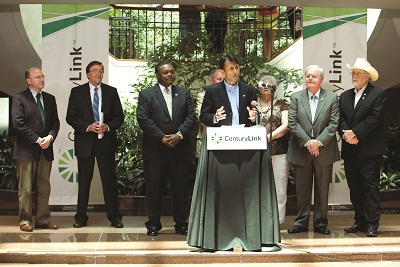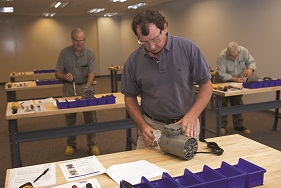
 Just four months into the Great Recession, Albemarle Corp. saw significant strides in Louisiana’s business environment and made a bold decision. The specialty chemicals maker announced its global headquarters would move from the capital of Virginia – Richmond – to the capital of Louisiana – Baton Rouge.
Just four months into the Great Recession, Albemarle Corp. saw significant strides in Louisiana’s business environment and made a bold decision. The specialty chemicals maker announced its global headquarters would move from the capital of Virginia – Richmond – to the capital of Louisiana – Baton Rouge.
With the move, Albemarle became the fifth Fortune 1000 firm headquartered in Louisiana; and despite having a significant administrative and manufacturing presence in the state prior to the move, the decision was not made lightly. Company leaders scrutinized cities throughout the Southeast region of the U.S. before selecting Baton Rouge.
In a nutshell, the difference came down to bold Louisiana leadership and the observance of a compelling new direction in the state. Within weeks of taking office, Governor Bobby Jindal had led the Legislature into special session and secured a sweeping set of ethics disclosure laws that would become a top-ranked model for the nation. And the Jindal administration eliminated an archaic sales tax on business purchases of natural gas, making substantial gas consumers like Albemarle instantly more competitive.
"We are focused on maximizing Albemarle’s global position to create long-term value and momentum and relocating our corporate headquarters to Louisiana is a key element in that strategy," said then-CEO Mark Rohr, who cited the new administration's ability to drive progressive initiatives for the state as a key reason for the 2008 move.
Four years later, the momentum continues. In 2012, GE Capital – one of the world's largest commercial lenders with $6.5 billion in 2011 earnings – examined metro areas across the U.S. and chose New Orleans as the site for its new 300-job GE Capital Technology Center.
Between the Albemarle move and the GE Capital site selection, Louisiana had climbed 32 spots on Chief Executive magazine’s ranking of Best/Worst States for Business to No. 13. After decades of underperformance, Louisiana also rocketed up other leading barometers of state business climates, as well. GE Capital could not ignore Louisiana's surging business climate nor New Orleans' peerless quality of life and value proposition. "When selecting a location for a center of this importance, we considered many attractive options across the country," said Brackett Denniston, senior vice president of parent company GE. "Louisiana rose to the top of our list because of the advantages it offers in terms of talent, infrastructure, location and environment. Governor Jindal and the Louisiana Legislature presented a compelling case for locating in Louisiana."
Between Albemarle and GE Capital, Louisiana did much more than overhaul its system of governmental ethics laws and remove antiquated business taxes. The state strengthened its Digital Interactive Media and Software Development Incentive, providing a tax credit of up to 35 percent on payroll and extending the incentive to interactive software development. That best-in-the-nation incentive not only attracted major digital gaming developers EA (to Baton Rouge) and Gameloft (to New Orleans), the corporate software eligibility helped convince the Schumacher Group, the nation’s third-largest emergency medicine management company, to select Lafayette, Louisiana, over Dallas, Houston and Atlanta for a more than 150 percent expansion of its Louisiana headquarters staff to nearly 1,000 jobs and to add a major new training facility and expanded headquarters space.
 Meanwhile in north Louisiana, corporate headquarters incentives and digital media incentives helped convince Fortune 500 firm CenturyLink to announce not one, but two major headquarters expansions in Monroe, Louisiana, leading to a combined 1,150 new direct jobs and total headquarters employment of nearly 3,000. Even before the CenturyLink project wins, Louisiana scored a signature retention win in 2009 on the strength of two other new landmark incentive programs. In an overhaul of Louisiana's workforce development programs, the state created LED FastStart™ – a turnkey, customized workforce solutions team that helps expanding companies rapidly ramp up their staff.
Meanwhile in north Louisiana, corporate headquarters incentives and digital media incentives helped convince Fortune 500 firm CenturyLink to announce not one, but two major headquarters expansions in Monroe, Louisiana, leading to a combined 1,150 new direct jobs and total headquarters employment of nearly 3,000. Even before the CenturyLink project wins, Louisiana scored a signature retention win in 2009 on the strength of two other new landmark incentive programs. In an overhaul of Louisiana's workforce development programs, the state created LED FastStart™ – a turnkey, customized workforce solutions team that helps expanding companies rapidly ramp up their staff.
FastStart and another new office created within the Louisiana Economic Development agency – LED’s Business Expansion and Retention Group (BERG) – took a planned closure of Gardner Denver Inc.'s 70-employee pump and compressor manufacturing site in Monroe and reversed the threatened closure into a stunning victory: After fielding LED’s offer and examining the potential provided by FastStart and BERG, Gardner Denver instead closed a Wisconsin plant and moved those operations to Louisiana. More than 200 employees and dozens of production lines made the trek to Monroe, and the conversion won unqualified praise from Gardner Denver CEO Barry Pennypacker.
"The outstanding training support provided by the State of Louisiana ... has been integral to the success of this project," said Pennypacker, who told Wall Street analysts that the Louisiana project contributed significantly to an improvement in company earnings in the very first quarter after the move.
A year later, Jindal and LED Secretary Stephen Moret joined Nucor Corp. executives to announce a new iron-and-steel mill project that’s becoming one of the largest industrial projects in Louisiana history. With a first $750 million phase under construction, Nucor plans five phases valued at $3.4 billion that would lead to 1,250 new direct jobs (with an average salary of $75,000) and an estimated 4,800 new indirect jobs in the Louisiana economy. After three years of aggressive recruitment, Moret said that “in terms of capital investment, jobs, tax revenues and the overall signal it sends about Louisiana’s economic momentum, Nucor’s project is one of the most significant wins in our state’s history.”
Since then, Louisiana announced a pair of $6 billion liquefied natural gas, or LNG, terminals in Southwest Louisiana, where South Africa-based Sasol Ltd. also has chosen a site for a potential $10 billion gas-to-liquids refinery that will convert natural gas into premium fuels.
 The noteworthy string of economic development wins set the stage for still other bold initiatives in Louisiana. In 2012, Jindal guided a landmark package of education reform bills into law, with greater school choice for families and greater autonomy for school administrators to make tenure and spending decisions.
The noteworthy string of economic development wins set the stage for still other bold initiatives in Louisiana. In 2012, Jindal guided a landmark package of education reform bills into law, with greater school choice for families and greater autonomy for school administrators to make tenure and spending decisions.
The education reform joined a strategic set of new Louisiana incentives aimed at attracting major corporate investments in highly competitive site selections. A single-factor corporate income and franchise tax based solely on in-state sales, without regard to payroll or property factors, will be available to targeted corporate headquarters, data center, logistics, clean technology, destination healthcare, R&D, renewable energy, digital media and software development projects.
For such competitive projects, Louisiana also is extending a 10-year property tax exemption traditionally granted to manufacturers. A third new incentive scales up payroll rebates for targeted projects to 15 percent, while a corporate headquarters incentive provides a 25 percent rebate on qualifying relocation costs from out of state. Companies must pay salaries of at least $60,000 a year, or twice the average private sector wage in the parish where they relocate, to be eligible.
Collectively, the new incentives enable major employers in high-growth sectors a more competitive site selection value in Louisiana than can be found anywhere in America. Combined with the workforce solutions of LED FastStart and a tax burden for new manufacturing firms that’s judged the best value in the nation by the Tax Foundation and KPMG, Louisiana offers business prospects unprecedented opportunity.
“Louisiana has made tremendous strides in its competitiveness, and we are seeing the results on the ground with more jobs and a more robust business development pipeline than ever,” said Greater New Orleans Inc. CEO Michael Hecht. “These new incentives represent important additional improvements in our business environment that will ensure our positive economic momentum continues.”
Related Agencies
- Foreign Trade Zone #154 - Baton Rouge
- Port of Greater Baton Rouge
- Baton Rouge Chamber of Commerce
- South Louisiana Economic Council
- SWLA-Chamber Economic Alliance
- Louisiana Central
- FTZ #124 - Gramercy, Louisiana - Port of South Louisiana
- Northeast Louisiana Economic Alliance
- North Louisiana Economic Partnership
- Port of South Louisiana
- The Chamber Foundation/Southwest Louisiana
- Louisiana Economic Development

